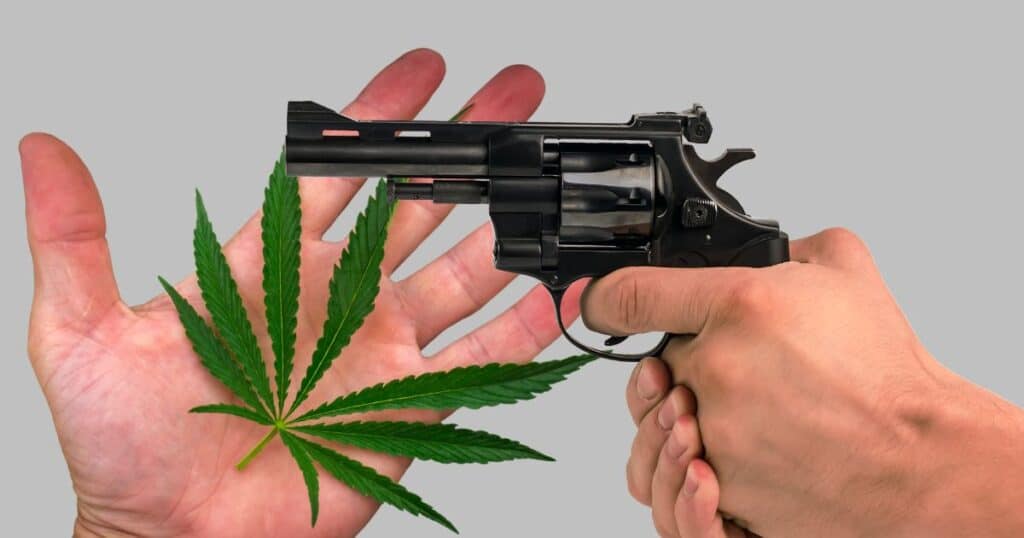In a stunning move last Friday, the Department of Justice (DOJ) has reiterated its controversial stance that medical marijuana patients who possess firearms “endanger public safety,” are more likely to commit crimes, and pose a greater risk of suicide. This position has sparked debate, particularly among those who see it as an outdated narrative that unfairly stigmatizes cannabis users.
Let’s explore the arguments presented by the DOJ, scrutinize the outdated cannabis prohibitionist narratives they rely on, and discuss why it’s crucial to modernize our understanding of medical marijuana and firearm ownership.
The federal government argued today that people who use medical marijuana in compliance with their state's laws can be disarmed because they "endanger public safety in multiple ways", such as being more likely to "mishandle firearms—or use firearms to commit crimes", "commit… pic.twitter.com/6BnZtj1x2M
— Firearms Policy Coalition (@gunpolicy) July 12, 2024
The Legal Battle in the Eleventh Circuit Court
Following a U.S. Supreme Court ruling on gun restrictions related to domestic violence, the case concerning medical marijuana users and firearm ownership was remanded to the Eleventh Circuit Court for reconsideration last week.
Former Florida Agriculture Commissioner Nikki Fried initiated a lawsuit against the DOJ in 2022, arguing that the federal statute banning gun ownership by medical marijuana patients violates their Second Amendment rights. While Fried is no longer involved, the case continues to gain traction, with plaintiffs seeking to overturn the initial district court ruling that deemed the ban constitutional.
In its recent filing, the DOJ urged the Eleventh Circuit Court to affirm the ruling, citing the Supreme Court’s decision in United States v. Rahimi. The DOJ contends that preventing medical marijuana users from owning guns aligns with historical principles of public safety.
The DOJ’s Argument Against Medical Marijuana Users Owning Guns
In the United States Court of Appeals For The Eleventh Circuit, the DOJ argues that individuals using medical marijuana are more likely to mishandle firearms or use them to commit crimes due to “drug-induced changes in physiological functions, cognitive ability, and mood.” This broad statement assumes that all cannabis users experience significant impairment, disregarding the nuanced effects of medical marijuana and its responsible use by patients.
Another point the DOJ makes is that marijuana users might commit crimes to fund their drug habit. This argument seems to equate medical marijuana patients with illicit drug users, ignoring the fact that these patients obtain their medication through legal channels, often under stringent state regulations.
The DOJ also claims that marijuana users pose a higher risk of suicide than ordinary citizens. While mental health is a serious concern, attributing an increased risk of suicide solely to medical marijuana use oversimplifies the issue and ignores various other contributing factors, such as underlying mental health conditions.

Outdated Prohibitionist Narratives
The narrative that cannabis users are inherently dangerous can be traced back to the early 20th century when cannabis prohibition was rooted in racial and social biases rather than scientific evidence. This historical context is crucial to understanding why these outdated views persist today.
Modern research consistently shows that medical marijuana can offer significant therapeutic benefits with minimal side effects when used responsibly. The DOJ’s arguments lack support from contemporary scientific studies that demonstrate the safe use of medical marijuana for conditions like chronic pain, anxiety, and epilepsy.
If the DOJ consistently applied its stance on marijuana and firearms, it would also prohibit alcohol users from owning guns. Alcohol impairs judgment and increases aggression more significantly than marijuana. Yet, there are no federal laws barring alcohol users from firearm ownership, showing an inconsistency in policy.
The DOJ’s arguments heavily rely on rulings and studies from over 30 years ago, a time when authorities either severely limited or outright suppressed comprehensive research on medical cannabis. This outdated foundation further highlights the disconnect between the DOJ’s stance and the current body of evidence supporting the safe and responsible use of medical cannabis.
Impact on Medical Marijuana Patients
For medical marijuana patients, the DOJ’s stance is an infringement on their Second Amendment rights. These individuals are compliant with state laws and rely on medical marijuana for their well-being. Disarming them based on outdated narratives undermines their constitutional rights.
Labeling medical marijuana patients as “dangerous” perpetuates stigma and can deter individuals from seeking the medical help they need. This is particularly troubling given the growing acceptance of medical marijuana as a legitimate treatment option.
Policymaking should be guided by contemporary scientific evidence rather than outdated prohibitionist narratives. Recognizing the evolving understanding of cannabis and its uses is essential to creating fair and effective laws.
The DOJ argues against medical marijuana patients owning firearms based on outdated, prohibitionist narratives that ignore modern scientific understanding and societal views on cannabis. It’s time to move towards policies informed by contemporary research and a fair assessment of risks and benefits. By doing so, we can ensure that medical marijuana patients receive the respect and rights they deserve while maintaining public safety.

















